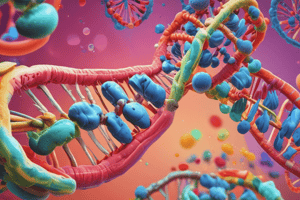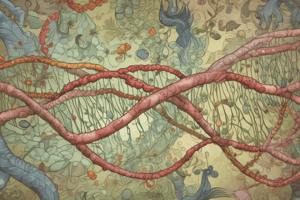Podcast
Questions and Answers
What is the mode of inheritance for the condition mentioned?
What is the mode of inheritance for the condition mentioned?
- X-linked recessive
- Autosomal recessive
- Autosomal dominant (correct)
- Mitochondrial
Ursodeoxycholic acid (UDCA) is used as a treatment for peripheral pulmonary artery stenosis.
Ursodeoxycholic acid (UDCA) is used as a treatment for peripheral pulmonary artery stenosis.
True (A)
What gene is associated with the pediatric condition mentioned?
What gene is associated with the pediatric condition mentioned?
JAG 1
The most common cardiac defect is _____.
The most common cardiac defect is _____.
Match the following conditions or treatments with their descriptions:
Match the following conditions or treatments with their descriptions:
Which of the following clinical features is associated with Cri du chat syndrome?
Which of the following clinical features is associated with Cri du chat syndrome?
A liver transplant is a standard treatment for peripheral pulmonary artery stenosis.
A liver transplant is a standard treatment for peripheral pulmonary artery stenosis.
What chromosome deletion is mentioned in the content?
What chromosome deletion is mentioned in the content?
Which of the following syndromes is associated with hypercalcemia?
Which of the following syndromes is associated with hypercalcemia?
Peripheral pulmonary stenosis is a clinical feature of William Syndrome.
Peripheral pulmonary stenosis is a clinical feature of William Syndrome.
What is the mode of inheritance for William Syndrome?
What is the mode of inheritance for William Syndrome?
In William Syndrome, the most common cardiac defect is __________.
In William Syndrome, the most common cardiac defect is __________.
Which clinical feature is NOT associated with Alagille syndrome?
Which clinical feature is NOT associated with Alagille syndrome?
Match the following syndromes with their respective characteristic feature:
Match the following syndromes with their respective characteristic feature:
The AAP does not recommend annual cardiology evaluations for patients with Williams syndrome.
The AAP does not recommend annual cardiology evaluations for patients with Williams syndrome.
What biochemical finding is typically seen in patients with Alagille syndrome?
What biochemical finding is typically seen in patients with Alagille syndrome?
Which of the following is NOT a clinical feature of Wolf Hirschhorn syndrome?
Which of the following is NOT a clinical feature of Wolf Hirschhorn syndrome?
Wolf Hirschhorn syndrome is inherited in an autosomal recessive manner.
Wolf Hirschhorn syndrome is inherited in an autosomal recessive manner.
What are common cardiac defects associated with Wolf Hirschhorn syndrome?
What are common cardiac defects associated with Wolf Hirschhorn syndrome?
Wolf Hirschhorn syndrome is characterized by a __________ nose.
Wolf Hirschhorn syndrome is characterized by a __________ nose.
Match the following features with their descriptions:
Match the following features with their descriptions:
Which of the following is a common mode of inheritance for Wolf Hirschhorn syndrome?
Which of the following is a common mode of inheritance for Wolf Hirschhorn syndrome?
Failure to thrive is a clinical feature associated with Wolf Hirschhorn syndrome.
Failure to thrive is a clinical feature associated with Wolf Hirschhorn syndrome.
What is one distinctive facial feature of Wolf Hirschhorn syndrome?
What is one distinctive facial feature of Wolf Hirschhorn syndrome?
Flashcards are hidden until you start studying
Study Notes
Trisomy 18 (Edwards Syndrome)
- Characterized by the presence of an extra chromosome 18.
- Commonly leads to severe developmental delays and organ defects.
FMR1 Gene
- Associated with Fragile X syndrome.
- 200 CGG repeats can result in premature ovarian failure.
Williams Syndrome
- Inheritance: Autosomal dominant.
- Laboratory findings include hypercalcemia.
- Most common cardiac defect: Supravalvular aortic stenosis (80% prevalence).
- Clinical features:
- Peripheral pulmonary stenosis.
- Long philtrum and broad mouth.
- Short nose with a bulbous tip.
- Eye problems: Strabismus, stellar irises.
- Behavioral traits: Known as 'cocktail personality.'
- Associated with mental retardation.
- Recommended evaluations: Annual cardiology assessments due to joint laxity.
Alagille Syndrome
- Inheritance: Autosomal dominant, caused by a deletion at 20p12.
- Gene implicated: JAG1.
- Clinical features:
- Triangular face with a pointed chin.
- Long nose and cholestatic jaundice.
- Paucity of bile ducts evident in liver biopsy.
- Butterfly vertebrae noted in skeletal assessments.
- Most common cardiac defect: Peripheral pulmonary artery stenosis and pulmonary valve stenosis.
- Treatment options include Ursodeoxycholic acid (UDCA) and liver transplant.
Cri Du Chat Syndrome
- Caused by a deletion on chromosome 5 (5p deletion).
- Distinguishing clinical features:
- High-pitched, cat-like cry due to anatomical changes in the larynx.
- Moon face with widely spaced eyes and a flat nasal bridge.
- Symptoms include hypotonia, down-slanting palpebral fissures, and microcephaly.
- Inheritance: De novo mutation.
- Associated with feeding difficulties and intellectual disabilities.
- Common cardiac defects include VSD, ASD, PDA, and TOF.
Wolf-Hirschhorn Syndrome
- Characterized by:
- Microcephaly.
- Hypertelorism (wide-set eyes).
- Prominent glabella and frontal bossing.
- Known for the “Greek helmet” facial appearance.
- Features a beaked nose indicative of the syndrome.
Studying That Suits You
Use AI to generate personalized quizzes and flashcards to suit your learning preferences.




